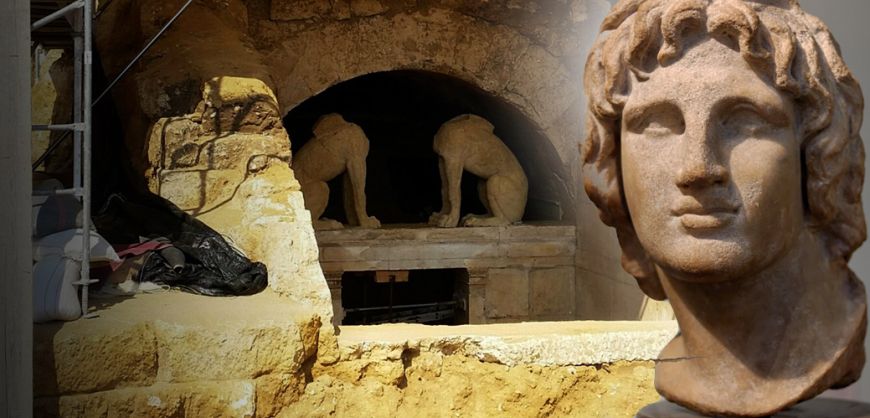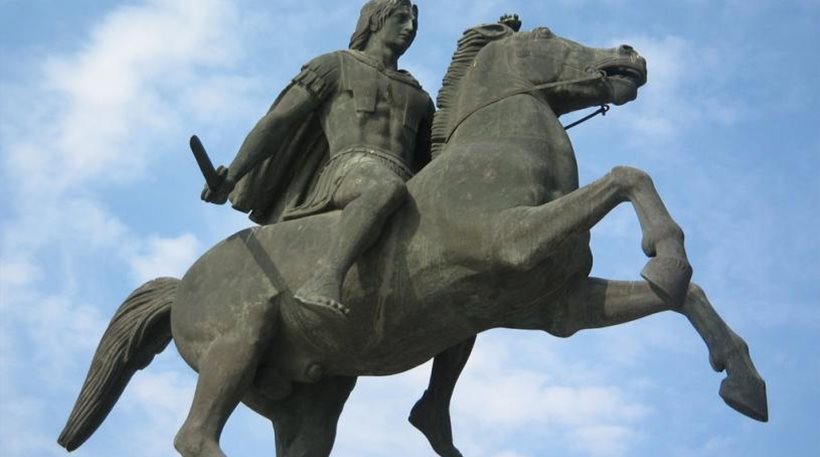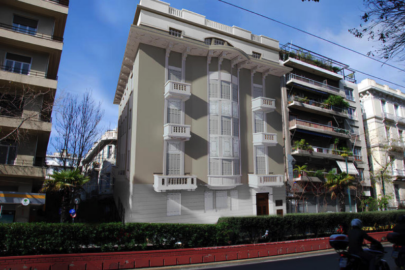Arrian of Nicomedia (Lucius Flavius Arrianus), a 2nd-century philosopher during the Roman period, is best known for having written “Anabasis of Alexander”, one of the best sources on the campaigns of Alexander the Great. His work, arguably the most complete account of the Greek conqueror’s life, may hold the key to the identity of the owner of the ancient tomb at Amphipolis or at least point to the inspiration behind it.
Clues to the secret of the ancient grave are held in the passage detailing a speech by Alexander the Great himself. The speech begins by stating the benefits Phillip II of Macedon had conferred to his countrymen and then he continues to talk about himself, in his own words:
“For though I inherited from my father only a few gold and silver goblets, and there were not even sixty talents in the treasury, and though I found myself charged with a debt of 500 talents owing by Philip, and I was obliged myself to borrow 800 talents in addition to these, I started from the country which could not decently support you, and forthwith laid open to you the passage of the Hellespont, though at that time the Persians held the sovereignty of the sea. Having overpowered the satraps of Darius with my cavalry, I added to your empire the whole of Ionia, the whole of Aeolis, both Phrygias and Lydia, and I took Miletus by siege. All the other places I gained by voluntary surrender, and I granted you the privilege of appropriating the wealth found in them. The riches of Egypt and Cyrene, which I acquired without fighting a battle, have come to you. Coele-Syria, Palestine, and Mesopotamia are your property. Babylon, Bactra, and Susa are yours. The wealth of the Lydians, the treasures of the Persians, and the riches of the Indians are yours; and so is the External Sea. You are viceroys, you are generals, you are captains. What then have I reserved to myself after all these labours, except this purple robe and this diadem? I have appropriated nothing myself, nor can any one point out my treasures, except these possessions of yours or the things which I am guarding on your behalf. Individually, however, I have no motive to guard them, since I feed on the same fare as you do, and I take only the same amount of sleep. Nay, I do not think that my fare is as good as that of those among you who live luxuriously; and I know that I often sit up at night to watch for you, that you may be able to sleep.”
“But some one may say, that while you endured toil and fatigue, I have acquired these things as your leader without myself sharing the toil and fatigue. But who is there of you who knows that he has endured greater toil for me than I have for him? Come now, whoever of you has wounds, let him strip and show them, and I will show mine in turn; for there is no part of my body, in front at any rate, remaining free from wounds; nor is there any kind of weapon used either for close combat or for hurling at the enemy, the traces of which I do not bear on my person. For I have been wounded with the sword in close fight, I have been shot with arrows, and I have been struck with missiles projected from engines of war; and though oftentimes I have been hit with stones and bolts of wood for the sake of your lives, your glory, and your wealth, I am still leading you as conquerors over all the land and sea, all rivers, mountains, and plains. I have celebrated your weddings with my own, and the children of many of you will be akin to my children. Moreover I have liquidated of all those who had incurred them, without inquiring too closely for what purpose they were contracted, though you received such high pay, and carry off so much booty whenever there is booty to be got after a siege. Most of you have golden crowns, the eternal memorials of your valour and of the honour you receive from me. Whoever has been killed has met with a glorious end and has been honoured with a splendid burial. Brazen statues of most of the slain have been erected at home, and their parents are held in honour) being released from all public service and from taxation. But no one of you has ever been killed in flight under my leadership. And now I was intending to send back those of you who are unfit for service, objects of envy to those at home; but since you all wish to depart, depart all of you! Go back and report at home that your king Alexander, the conqueror of the Persians, Medes, Bactrians, and Sacians; the man who has subjugated the Uxians, Arachotians, and Drangians; who has also acquired the rule of the Parthians, Chorasmians, and Hyrcanians, as far as the Caspian Sea; who has marched over the Caucasus, through the Caspian Gates; who has crossed the rivers Oxus and Tanais, and the Indus besides, which has never been crossed by any one else except Dionysus; who has also crossed the Hydaspes, Acesines, and Hydraotes, and who would have crossed the Hyphasis, if you had not shrunk back with alarm; who has penetrated into the Great Sea by both the mouths of the Indus; who has marched through the desert of Gadrosia, where no one ever before marched with an army; who on his route acquired possession of Carmania and the land of the Oritians, in addition to his other conquests, his Beet having in the meantime already sailed round the coast of the sea which extends from India to Persia-report that when you returned to Susa you deserted him and went away, handing him over to the protection of conquered foreigners. Perhaps this report of yours will be both glorious to you in the eyes of men and devout I ween in the eyes of the gods. Depart!”
Though references aren’t made to the mound at Kasta Hill, questions are raised as to whether one of the audience members present at the speech may have been motivated to create such a burial mound on his return home while the words of the great warrior king still reverberated in his ears.
The creation of the tomb may have been an act of insolence or vanity as the love-hate relationship between Alexander the Great and his generals is well known, especially in relationships such as those with Antipater and Cassander.
As for the rest of the Arrian’s account:
“Then those of the Macedonians who were unfit for service on account of age or any other misfortune went back of their own accord, to the number of about 10,000. To these Alexander gave the pay not only for the time which had already elapsed, but also for that which they would take in returning home. He also gave to each man a talent in addition to his pay.“
Could the owner of the ancient tomb been one of the 10,000?




































